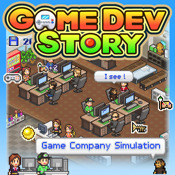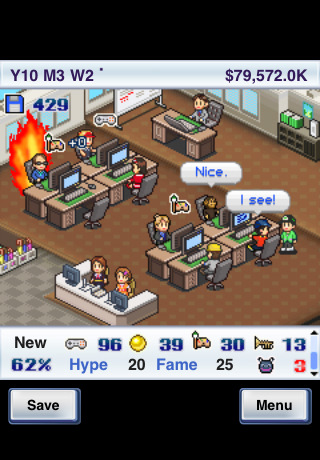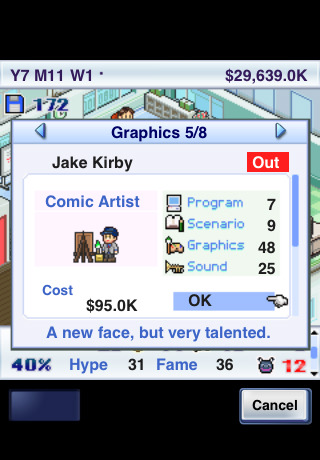Game Dev Story
| Game Dev Story | |
|---|---|
 |
|
| Platforms | iOS |
| Genre | Yo dawg, I heard you like games... |
| Score | 8  |
| Buy from iTunes | |
I’ve played a few iOS games this year, mostly just picked stuff up from word of mouth or something a friend developed. I started hearing about this little simulation title called Game Dev Story, and after reading up on the premise and reading about some crazy sounding experiences on Twitter, I had to check it out.
In a way, it’s basically in the genre of games my wife loves on her iPod Touch: the simple yet addictive management simulator. She loves Sally’s Spa and Diner Dash (and I’ll admit, I tried them both out and while I could easily recognize why someone would like them, they quickly became stale), and on the surface, Game Dev Story isn’t much different.
But it is different, and that’s why I’m bothering to write about it. Warning: Game Dev Story is extremely addictive, deep, and funny. Read on for my review.
What I loved: What most games in the management sim genre are lacking is depth. There might be an illusion of it where you need to balance a horde of customers or select how many things to buy before a sale, but it all pales in comparison to Game Dev Story. Do you want to make a musical romance game? Would you like to hire a bunch of hackers to fill your office ranks? How about hiring booth babes to attend E3 for you? This game can do it all and more.
The main point of Game Dev Story is to create video games. You start out humbly developing for the PC because it’s cheap and doesn’t require a license fee. After making some crappy Reversi games you should have enough capital for the Intrendo Entertainment System license fee. Then you’re challenged to start actually coming up with some intriguing ideas and combinations. For every game you select a genre and a type. RPGs and Fantasy games go together well, of course, but what about Pirate Trivia games (not so much)? Most of the combinations just make sense like Ninja Action, Robot Shooter, and yes, Audio Romance.
To develop a game though, you need a staff, and a well-balanced group at that. The main components of a game are fun, creativity, graphics, and sound. Every potential developer has stats in coding, scenario, graphics, and sound. For every game you need to designate a lead writer, artist, and musician, so you need a well-rounded team unless you want to pay out the nose for contracting help. You also shouldn’t reuse the same writer every time or they’ll get burned out, and it’s obvious that some writers are better at writing Halo clones than Final Fantasy 25.
You have a lot of plates spinning while playing Game Dev Story. You need to keep a good staff on hand and increase their skills through training, promotions, and career changes. You also need to keep the games pumping out or you might lose fans (which can also be increased through advertising and word of mouth in gaming magazines). You also need to watch your capital to make sure you don’t run out of cash when it comes to pay your team’s salaries in March. And there’s game conventions and game of the year awards to worry about too.
But Game Dev Story is fun! It’s awesome to finally find a winning combination of genre/type on a brand new platform and watch millions of sales roll in. This is a great lesson on how the industry works as the window to sell a game is very small and the market is competitive, but at the same time your team can release four games a year and never get burned out. I guess we shouldn’t become too disillusioned!
 What I liked: Game Dev Story is very well polished so I thought I’d just rattle off some ideas that really went over well with me. Being able to name each of your games is a nice touch, if obvious. Gives each title a bit of personality. It’s also neat being able to create real sequels to hall of fame titles (games that received at least 32/40 points from Famitsu-like reviewers). At first I would just call something like Game 2, but it’s obvious that selecting the sequel option gives it a nice boost in sales.
What I liked: Game Dev Story is very well polished so I thought I’d just rattle off some ideas that really went over well with me. Being able to name each of your games is a nice touch, if obvious. Gives each title a bit of personality. It’s also neat being able to create real sequels to hall of fame titles (games that received at least 32/40 points from Famitsu-like reviewers). At first I would just call something like Game 2, but it’s obvious that selecting the sequel option gives it a nice boost in sales.
The annual events are a nice way to mark time too. The gaming convention, while a little stale after your 10th trip or so, is a convenient time to release a game and get a jump on sales. Then there’s the end of the year gaming awards where a bunch of randomly generated titles like “Medical Gear” square off against your games for cash prizes. There’s even a $300,000 punishment for releasing the worst game of the year!
The progression of consoles available is also not only a good history lesson, but an easy way to tell which systems you should be developing for. When you see that Virtual Boy system announced, you know sure well you need to avoid it. But when the Intrendo Whoops is announced, yeah, you gotta get on that motion controlled bandwagon. As a final added bonus, you can even release your own console! EA, eat your heart out!
What I didn’t like: Probably most disappointing are the game’s graphics. Only about two-thirds of the screen is used leaving the rest black. While the view of your office is static besides your little developers running around, there are quite a few menus to navigate that could have benefited greatly from the expanded screen real estate. The most annoying thing is the bottom bar which is used to display a ton of different information. The problem is, you have to scroll through it all bar by bar. These bars could have easily all been shown at the same time. Annoying to say the least.
Game Dev Story also tears through the battery. I’m not sure if the game is just unoptimized for the system or if the Apple iPod Touch’s battery is just this poor, but charging the game every two or three hours is just obnoxious.
Finally, while the pixel art graphics are cute, I feel like there was a lot of lost opportunity to really have some fun. There’s a few jokes thrown out there with Coder X who looks like Racer X from Speed Racer, but other than that it just looks like an office. It may have been cool to generate fake game covers from the genre/type combination or even have more of a hand in scenario design (like designing the main character to appeal to a certain group of fans).
Scores
 Gameplay: 9
Gameplay: 9
Very deep simulation gameplay with tons of options and even more replayability. After finishing, I immediately started over so I could try a few different tactics in hiring staff and selecting different systems to develop for.
Fun Factor: 8
Game Dev Story becomes a bit repetitive as the years roll on, but there’s always something fun and challenging to do. I like games that bring a smile to my face, and this does it in spades.
Graphics and Sound: 6
The pixel art is great, but when you only use about two-thirds of the available screen, it kind of makes me think this was a rushed port from a cell phone or something (though the English translation is pretty dang good). There’s no voices in the game but the background music is tolerable.
Story: 8
Not a true story in Game Dev Story, but you do have 20+ years of consoles to develop for along with tons of little industry inside jokes around every turn.
Overall: 8
One of the best iOS games I’ve ever played and a real winner in the simulation department. I would love to see a sequel on the Nintendo DS with even more options, but for only $4 on the iPod Touch, iPhone, or iPad, this is one cheap game you should not pass up.
